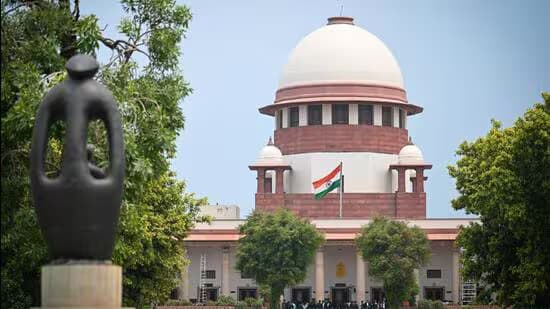
Supreme Court Directs ECI to Formally Accept Aadhaar as Voter ID Proof
Court says Aadhaar to be treated as 12th identity document for Bihar voter list, but not proof of citizenship.
The Supreme Court on Monday ordered the Election Commission of India (ECI) to issue a formal notice clarifying that Aadhaar will be accepted as an identity proof document for inclusion in the revised electoral roll being prepared in Bihar under the Special Intensive Revision (SIR).
The directive, earlier limited to 65 lakh voters proposed to be deleted from the rolls, has now been extended to all voters.
A Bench of Justices Surya Kant and Joymlaya Bagchi stated that Aadhaar will serve as the twelfth valid identity document, in addition to the eleven documents already recognised by the ECI. However, the Court emphasised that Aadhaar can only establish residence and not citizenship.
The Bench added that the ECI is entitled to verify the authenticity of Aadhaar cards submitted, to ensure they are genuine and not forged.
“Aadhaar card shall be accepted for the purpose of inclusion or exclusion in the revised voters’ list as the 12th identity document. However, Aadhaar will not be proof of citizenship, and authorities shall have the right to verify its authenticity. The ECI shall issue instructions during the course of the day,” the Court ordered.
The Court was hearing petitions challenging the ongoing Bihar SIR exercise, during which 65 lakh names had earlier been dropped from the draft roll published on August 1. On August 14, the Court directed the ECI to upload the list of excluded names, and on August 22 it permitted those excluded to use Aadhaar as proof of residence to be reinstated.
Senior Advocate Kapil Sibal argued that Booth Level Officers (BLOs) were still refusing Aadhaar unless it was accompanied by another identity document, contrary to the Court’s earlier orders. He alleged that show-cause notices had been issued against officers who accepted Aadhaar, adding that the absence of a formal ECI directive was causing confusion on the ground.
Representing the ECI, Senior Advocate Rakesh Dwivedi denied these claims, stating that Aadhaar was already being advertised as acceptable proof, while reiterating that it cannot be treated as proof of citizenship.
The Court questioned why certain ECI notices still mentioned only 11 documents, and stressed that Aadhaar is recognised under the Representation of the People Act, 1951, as proof of residence.
Advocates Ashwini Upadhyay, Vrinda Grover, and Gopal Sankaranarayanan also made submissions, with concerns ranging from the risk of forged Aadhaar cards to the exclusion of poor voters. The Court maintained that the ECI must ensure clear instructions reach field officers so Aadhaar is recognised as the twelfth identity document.
In previous hearings, the Court had asked political parties and the Bihar State Legal Services Authority to assist excluded voters in filing online claims or corrections. It declined to extend the September 1 deadline but noted the ECI’s assurance that objections filed later would still be considered before finalisation of the electoral roll.
For any enquiries please fill out this form, or contact info@thelawreporters.com and Follow The Law Reporters on WhatsApp Channels